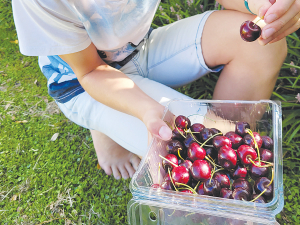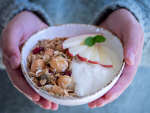New Zealand grown are jam packed with components essential to human health, according to new research.
Work done at the Riddet Institute, at Palmerston North’s Massey University, has shown that cherries can join the ranks of blueberries and other colourful fruits grown in New Zealand with their impressive antioxidant and vitamin profile.
The research into New Zealand cherries was jointly funded by a grant from the High- Value Nutrition National Science Challenge to Cherri Health and Manufacturing (CH&M) and the Bioresource Processing Alliance with Cherri Global.
The research was carried out by the scientists at the Riddet Institute and Plant & Food Research over the course of several months late last year.
Riddet Institute lead scientist Dr Ali Rashidinejad says this study is the first of its kind to systematically analyse the nutritional and bioactive (phytochemical) compositions of the main cherry varieties grown in New Zealand. Earlier research has focused on cherries grown overseas.
The Riddet Institute is a Centre of Research Excellence (CoRE), hosted by Massey University, which focuses on fundamental and advanced food research.
Cherri Global, based in Hawke’s Bay, has a business division focused on developing a range of Cherry products focused on health and eliminating waste.
Rashidinejad says cherries contain numerous nutrients such as vitamins A, E, K, C and B, carotenoids, lutein, and zeaxanthin. Cherries have been recognised for providing significant health benefits such as decreasing markers for oxidative stress, inflammation, exercise-induced muscle soreness and loss of strength. They are also thought to improve blood pressure, arthritis, and sleep.
Rashidinejad says there are 17 main varieties grown in New Zealand. This study focused on six top-selling varieties grown in Cherri Global orchards in Otago: Bing, Rainier, Kordia, Lapins, Sweetheart, and Staccato.
The study also compared fresh and packaged cherries to learn if nutrients were lost during processing.
Researchers looked at proteins, carbohydrates, sugars, fats, fibre, fat-soluble vitamins, and water-soluble vitamins.
“Basically, in terms of nutrient profiles, we have explored everything we could. And the same with the bioactive compounds,” Rashidinejad explains.
“We concluded that all six varieties were rich sources of different nutrients: minerals, vitamins, amino acids, and phenolic compounds – the antioxidants.
These latter compounds, the phenolic compounds, were what most interested us because they are potent antioxidants with numerous scientifically proven health-promoting properties.”
Rashidinejad says almost 30 phenolic compounds were studied, in collaboration with Plant & Food Research, using high pressure liquid chromatography techniques.


















